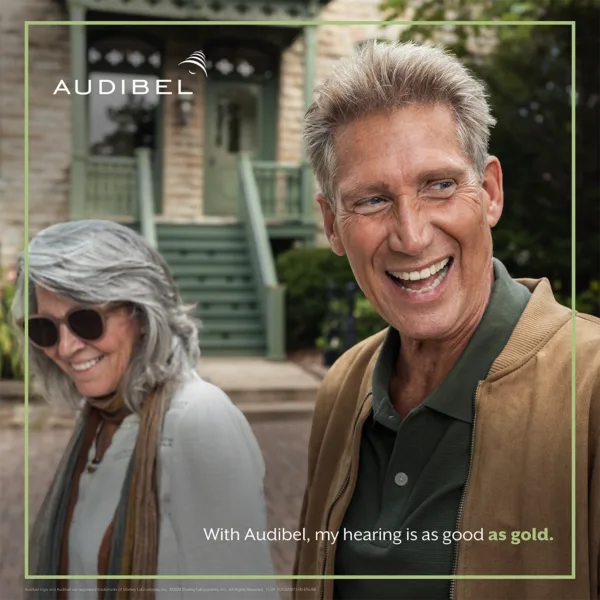
As we get older, many parts of our body don’t work as they once did, and ears are no exception. Recognizing the early signs of age-related hearing loss is crucial to early treatment, which will preserve your enjoyment of social activities, help you hear all the conversations that are most important to you, and increase your access to the everyday sounds that enrich your life.
What Is Age-Related Hearing Loss? (Presbycusis)
Most people will eventually develop age-related hearing loss, also known as presbycusis. In fact, among the elderly, or even middle-aged adults, it’s quite common. While the cause seems inherent in its name, there are many causes of age-related hearing loss. The tissues of our bodies deteriorate with age, which can interfere with their function. Most presbycusis is the result of a diminishing number of hair cells in your inner ear, which act as receivers, transforming the vibrations to signals sent via nerve cells to the brain. Your genetics, prolonged exposure to loud noises, and even cigarette smoking can kill these important hair cells. Other contributing factors to experiencing hearing loss with age include health conditions such as diabetes, and high blood pressure. Less common causes are deterioration in the middle ear or the auditory nerve itself.
When Does Age-Related Hearing Loss Start?
Age-related hearing loss typically begins around the age of 65, though a study published in 20111 indicated that more than 20% of adults 48-59 already suffer from it. According to the National Institute on Aging, approximately a third of adults between the ages of 65 and 74 experience age-related hearing loss, and that number rises to 50% at 75, going up to as much as 90% for adults more than 80 years old.
How to Spot the Signs of Age-Related Hearing Loss
Everyone has trouble hearing on occasion, whether because of ambient noise or perhaps congestion from a head cold. However, if you have more than one of the following symptoms, especially if they happen often, it could be time to get a hearing health exam.
Early Symptoms of Age-Related Hearing Loss
If your ability to hear has diminished, the first things you may notice are things like frequently asking people to repeat themselves, turning the volume up on your audio sources more than usual, or not hearing every word of conversations in crowded or loud rooms. You may also notice that hearing the voices of women and children is more difficult than voices in lower ranges, and that some consonants are especially difficult to make out, such as S, T, K, P, B and F.
Many people find that their friends and family notice a change before they do. Have others complained that you haven’t been listening, or that you have the TV volume too high? They may be onto something.
Other Symptoms of Age-Related Hearing Loss
Some signs that you may be developing hearing loss may surprise you. These less-obvious symptoms can seem unrelated to your ears or hearing. It’s important to pay attention to these signals, so that you can return to fully engaging in your life and not suffer any indirect consequences of hearing loss.
- You avoid crowded, noisy venues
- You feel tired after conversing for long periods
- You are experiencing balance issues or dizziness
- Your ears have begun ringing
Why Detecting Age-Related Hearing Loss Early Is Important
While somethings can be ignored and accepted as part of aging, losing your hearing is not one of them. Early detection and treatment are important, because not being able to hear can impact your life in so many ways, some of which may not immediately be apparent.
Quality of Life
When you can’t hear well, you may find socializing tiring, something to be avoided, when you used to look forward to it and enjoy it. Having to say “what” so much can also be embarrassing. You may find that, rather than doing so yet again, you simply nod and pretend to hear. This can lead to misunderstandings later, if the content was important. It may also lead to hurt feelings all around, if you appear to have forgotten something.
Missing Health or Safety Instructions
Smiling and nodding when you can’t hear carries compounded risk, if you’re at a medical appointment or consulting with a pharmacist. In addition, not being able to hear auditory warnings of danger can put your very life in jeopardy. While walking, you may not hear someone warning you of a tricky porch step or other obstacle, or a cyclist calling out “on your right” before passing you.
Hearing loss can also interfere with your ability to hear CO2 and smoke detector alarms, car horns, fire alarms, and other auditory safety alarms.
Secondary Issues Associated with Age-Related Hearing Loss
Untreated hearing loss can have a profound effect on your emotional, mental, and physical wellbeing. The stress, anxiety, fatigue, and depression associated with the inability to engage fully with conversations and clearly hear all the sounds in your daily life can lead to other health problems or make existing ones worse.
Isolation: People with hearing loss tend to pull away from social situations, shrinking their social circle2
Depression: Older adults with hearing loss have a greater risk of developing depression3
Dementia: Older adults with hearing loss could be at a greater risk of dementia4
Falls: People with hearing loss are more apt to have an injurious fall5
Schedule a Hearing Exam Today
Getting your hearing checked on a regular basis can help to address any hearing deficits before they interfere with your quality of life, and worse still, lead to other issues. We encourage you to take proactive steps to preserve your hearing by meeting with one of our highly experienced audiologists at any of our hearing clinics conveniently located throughout the United States.
Don’t wait until it’s too late – schedule an exam today to protect your hearing for years to come.
1 “The Prevalence of Hearing Impairment and Associated Risk Factors: The Beaver Dam Offspring Study published May 16, 2011 in JAMA Arch Otolaryngol Head Neck Surgery.
2 “Hearing-impaired elderly people have smaller social networks: A population-based aging study” published by Elsevier in 2019.
3 “Hearing Loss, Hearing Aid Use, and Depressive Symptoms in Older Adults-Findings from the Atherosclerosis Risk in Communities Neurocognitive Study (ARIC-NCS),” published February 17, 2021, by Oxford University Press on behalf of The Gerontological Society of America.
4 “Examining the Combined Estimated Effects of Hearing Loss and Depressive Symptoms on Risk of Cognitive Decline and Incident Dementia,” published May 5, 2022, by Oxford University Press on behalf of The Gerontological Society of America.
5 “Hearing Loss and Falls Among Older Adults in the United States,” authored by Frank R. Lin, MD, PhD and Luigi Ferrucci, MD, PhD and published in JAMA Arch Otolaryngol Head Neck Surgery on February 27, 2012.







Have a question or Comment?